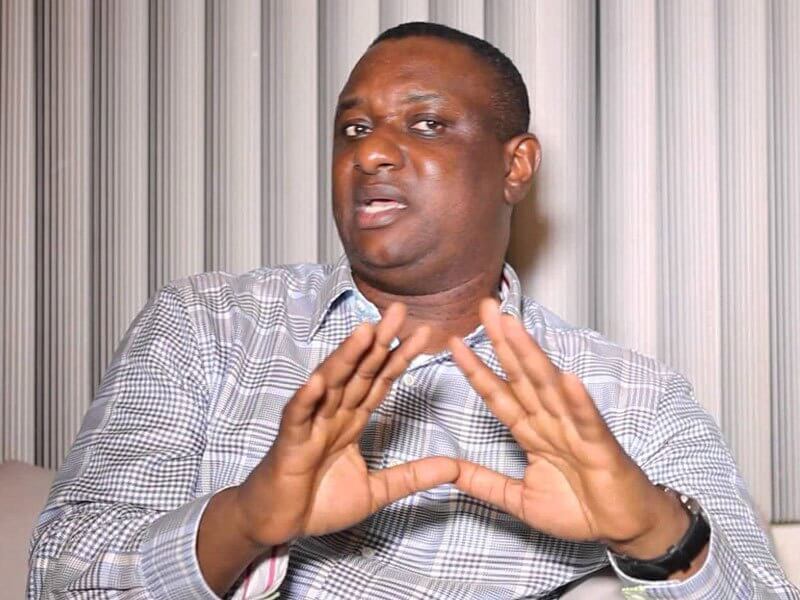News
My Properties Abroad Not Acquired With Public Funds – Festus Keyamo

The Minister of State for Labour and Employment, Festus Keyamo, has provided clarification a property he was said to have acquired in the United States of America.
Keyamo, in a statement via his verified Twitter handle on Saturday, said he did not acquire the house with stolen funds.
Recall that the Minister has been trending on social media after he appeared before a building in the US.
But, he has confirmed that the property belongs to him, noting that he acquired it with money he made from legal practice.
READ ALSO’ 2023: ‘You’re Political Prostitute, Wanderer, Back-stabber,’ Keyamo Hits Dogara
Keyamo said he was only trying to bait the horde of those he called sore losers at the last elections with a video of his vacation in “one of my properties abroad” amid a light workout.
He said they fell so terribly for the bait, adding hat they seem to view everyone from their depraved universe and assuming everyone will wallow in the same moral squalor as them.
On how he acquired the property, Keyamo said he had, on March 6, 2019, written to the relevant government agencies, informing them of the closure of his foreign account(s) and the repatriation of the funds to the country, “being some savings I had made as a private legal practitioner and a property investor over decades.”
READ ALSO: We’re Not Mates In Politics, Dogara Barks At Keyamo
According to Keyamo, the foreign funds were lying in his accounts until he was appointed Minister in 2019.
He stated, “In 2021, I again wrote to the relevant agencies (by letters dated January 22, 2021), informing them of the movement of those funds out of the country to purchase a property as a better investment decision, instead of the funds lying idly in the account whilst I am in public office.”
The Minister said he laughed when he saw the trending issues regarding “just one of my properties in the US.”
He said it was laughable that some people think that he (Keyamo) could not afford such a property after his 30 years of active, high-profile practice of law.
Keyamo added that he has been underrated because he had chosen to live a simple and modest life and not given to the ostentatious display of wealth.
READ ALSO: Twitter Ex-CEO, Ex-Jack Dorsey Launches Twitter Alternative
He said the building is “about the cheapest of my several properties.”
Keyamo added that his flourishing and manned law chambers and his real estate investments are still far more financially profitable than serving Nigeria.
“Ours is a labour of love to my country,” he said.
He added that “Some of us don’t need Government funds or patronage to get by.”
News
Edo SWAN Distances Self From Online Publication Against Enabulele

…demands retraction, warns member against unverified publication
The Sports Writers Association of Nigeria (SWAN), Edo State Chapter, has distanced itself from an online publication titled: ‘Samuel Ogbemudia Stadium Shut Against Stephen Keshi.’
A statement signed by the Secretary of the association, Comrade Idahosa Moses, Edo SWAN said neither was it consulted nor involved in the “framing of the narrative presented by the online publication.”
Edo SWAN described the publication as misleading, sensational and grossly lacking in factual balance.
The statement partly reads: “SWAN finds the report inconsistent with the ethical standards and core values of the journalism profession.
READ ALSO:SWAN Orders Nationwide Boycott Of NFF Activities
“While Edo SWAN recognises and respects the sentiments expressed by Mr. Austin Popo, Secretary of the Board of Trustees of the Stephen Keshi Football and Vocational Training Centre (SKFTVC), concerning the challenges encountered in securing the use of the Samuel Ogbemudia Stadium for this year’s Stephen Keshi Memorial National Under-17 Soccer Tournament, it is imperative to state that such concerns should not be reported in a manner that imputes motives, assigns blame without verification, or portrays public officials as acting in bad faith.”
On allegations against the Executive Chairman of the Edo State Sports Commission, Hon. Amadin Desmond Enabulele, in the publication, SWAN described Enabulele as a “seasoned professional with a proven track record of integrity and dedicated service to sports development in Edo State.”
“Any insinuation that he or the Commission deliberately acted to undermine the memory and legacy of the late Stephen Okechukwu Keshi is not only unfair but also unsupported by verifiable facts.”
Edo SWAN, therefore, “strongly cautions the publisher of Popular News to desist from publishing unverified and inflammatory reports capable of misleading the public and damaging reputations.”
READ ALSO:Botswana’s New President Sworn In As Voters Kick Out Ruling Party Of Nearly Six Decades
“The Association formally demands that the controversial publication be withdrawn immediately and that an unreserved apology be tendered to Hon. Amadin Desmond Enabulele.”
SWAN further “extends its sincere apologies to the Chairman of the Edo State Sports Commission, who is also a Patron of the Edo SWAN Chapter, for any embarrassment or misrepresentation arising from the said publication, and assures him of its continued respect, support and cooperation.”
Edo SWAN, while stating that it “shares in the collective responsibility of preserving and honouring the legacy of the late Stephen Keshi—a national icon whose contributions to Nigerian football remain indelible—the Association, maintained that “this noble course must be pursued through constructive engagement, professionalism and mutual respect among all stakeholders.”
Edo SWAN, thereafter, warned “all sports writers in the state to avoid unverifiable reports and sensationalism, stressing that any member found culpable of professional misconduct will be decisively sanctioned in line with the Association’s statutes.”
News
Court Dissolves Petitioner’s Marriage Over Lack Of Love, Care

An Area Court sitting at Centre-Igboro, Ilorin in Kwara State, on Thursday, dissolved the four-year-old marriage between Aminat Mustapha and Wahab Adeshina, following the petitioner’s insistence.
The petitioner told the court that she was no longer interested in her marriage to her husband following claims of lack of love and care.
According to the News Agency of Nigeria (NAN), while delivering ruling, the presiding judge, Mr Toyin Aluko, held that the respondent had written to the court, accepting the divorce application made by his wife.
READ ALSO:Why I Charged My Husband Money For Sex —Woman
Aluko, consequently, dissolved the marriage between the parties, and ordered the woman to observe one month iddah (waiting period) before she could remarry.
Meanwhile, the court granted custody of the two children in the marriage, ages one and three, to their mother.
He ordered the father to pay a monthly sum of N20,000 for the children’s feeding and maintenance.
The court also held that the respondent will be responsible for their education and healthcare.
Again, the court held that the father has unrestricted access to his children, but at reasonable time adding that he should be notified before any decision is taken on his children.
The judge ordered the petitioner to get a copy of the judgment and send same to the respondent.
News
Tinubu Embarks On Three-state Visit

President Bola Ahmed Tinubu will depart Abuja on Saturday on a working visit to Borno, Bauchi and Lagos.
This is contained in a statement issued by Presidential Spokesperson, Mr Bayo Onanuga, on Friday in Abuja.
While in Borno, the President will commission projects executed by the Borno State Government under Gov. Babagana Zulum, in collaboration with the Federal Government.
He will also attend the wedding ceremony of Sadeeq Sheriff, son of former Borno Governor, Sen. Ali Modu Sheriff, and his bride, Hadiza Kam Salem.
READ ALSO:Ambassadorial Nominees: Ndume Asks Tinubu To Withdraw List
From Maiduguri, Tinubu will proceed to Bauchi State to condole with the state government and the family of Sheikh Dahiru Bauchi, the renowned Islamic cleric and leader of the Tijjaniyya Muslim Brotherhood.
Sheikh Dahiru Bauchi died on Nov. 27.
After the condolence visit, the President will travel to Lagos, where he will spend the end-of-year holidays.
During his stay in Lagos, Tinubu is expected to attend several engagements, including the Eyo Festival scheduled for Dec. 27.
The festival, to be held at Tafawa Balewa Square, will honour notable personalities, including the President’s late mother, Alhaja Abibatu Mogaji, former Lagos State governors Alhaji Lateef Jakande and Chief Michael Otedola.

 Sports5 days ago
Sports5 days agoJUST IN: Dembélé Named FIFA Best Men’s Player, Bonmatí Wins Women’s Award

 News5 days ago
News5 days agoWage Dispute: Court Orders PSG To Pay Mbappe €61 Million

 Headline5 days ago
Headline5 days agoAircraft Crashes In Owerri With Four Persons Onboard

 Metro3 days ago
Metro3 days agoAlleged Organ Harvesting: Bereaved Families Rush To Check Corpses

 Business5 days ago
Business5 days ago9th FirstBank Digital Xperience Centre Launched In UNIBEN

 News5 days ago
News5 days agoOkpebholo Presents ₦939.85bn ‘Budget Of Hope, Growth’ To Edo Assembly

 Business5 days ago
Business5 days agoCBN Revokes Licences Of Aso Savings, Union Homes As NDIC Begins Deposit Payments

 News5 days ago
News5 days agoTrump Places Nigeria, 14 Others On Partial Travel Restrictions To US

 News4 days ago
News4 days agoForest Reserve: Okpebholo Broker Peace Between Host Communities, Investors

 News5 days ago
News5 days agoOPINION: Man-of-the-people, Man-of-himself






























